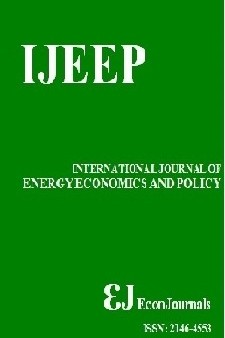Travel Demand Management Policy Instruments, Urban Spatial Characteristics, and Household Greenhouse Gas Emissions from Travel in the US Urban Areas
Travel Demand Management Policy Instruments, Urban Spatial Characteristics, and Household Greenhouse Gas Emissions from Travel in the US Urban Areas
parking management, promotion of transit use and carpool, employer-based TDM program, CO2 emissions from household travel, population-weighted density employment and population distribution imbalance,
- Başlangıç: 2011
- Yayıncı: İlhan ÖZTÜRK
Energy Safety and Innovative Development of the BRICS States
Irina Aleksandrovna Rodionova, Maksim Vasilyevich Chernyaev, Anna Vadimovna Korenevskaya
Energy Policy of the European Union: Challenges and Possible Development Paths
Mihail Nikolaevich DUDİN, еvgenia еvgenevna FROLOVA, Valentina Nikolaevna SİDORENKO, Ekaterina Alexandrovna POGREBİNSKAYA, İrina Vladimirovna NİKİSHİNA
Marzieh Rahimi, Abbas Alavi Rad
Testing the Shock Effect of Some Policy Variables on Electricity Generation in Nigeria
Samuel Nnamdi Marcus, Amachukwu Chibuzo Okezie
The Lebanese Pre-salt Oil and Gas Production Economic Challenges and Revenues
On the Dynamics of Energy-growth Nexus: Evidence from a World Divided into Four Regions
Luís Miguel Marques, José Alberto Fuinhas, António Cardoso Marques
Ivan A. Kapitonov, Vitaly G. Korolev, Anatolii A. Shadrin, Aleksei A. Shulus
Does Organizational Support Affect Employees' Commitment to Implement Biogas Programs?
Problems and Prospects of Innovative Development of Petrochemical Enterprises
Olga Viktorovna LENKOVA, Anton Stanislavovich PERMYAKOV, Olga Gennadyevna YAKUNİNA, Marina Vyacheslavovna VECHKASOVA
Energy Efficiency Standards and Labels for Cold Appliances in Jordan
